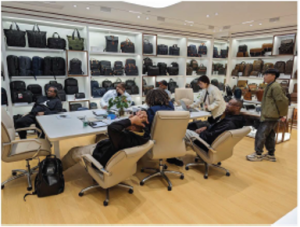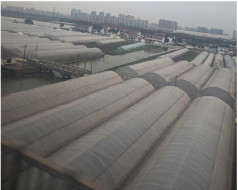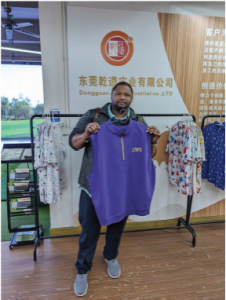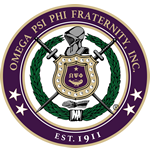From the Desk of John F. Howard (International Executive Director of The Omega Psi Phi Fraternity, Inc.)
From March 7, 2024, to March 9, 2024, I embarked on a journey to mainland China with a company led by Brother Jonathan Brown (3’08’Psi Epsilon), Basileus of the Chi Mu Nu chapter in Shanghai, CN and owner of the Pineal Consulting Group, a management consulting firm that specializes in supply chain management. The trip aimed to gain insights into production processes, quality control requirements, shipping logistics, and opportunities for brand protection. This report summarizes the observations and findings made during the trip, providing valuable insights into the manufacturing landscape in China and opportunities for enhancing operational efficiency and brand integrity. On this trip I was accompanied by three fellow Executive Directors in the National PanHellenic Council, Sean McCaskill (Alpha Phi Alpha Fraternity, Inc.), John Burrell (Kappa Alpha Psi Fraternity, Inc.) and Karen Williams (Sigma Gamma Rho Sorority, Inc.). We participated in a round table discussion that highlighted best practices for the vending program and the advantages of approaching our challenges as a collective. The conversation ended with a synergy that more collaboration is needed to obtain optimal results.
 The manufacturing process in China involves several key steps, typically concentrated in cities along the coastline bordering the East China Sea. Cities such as Shanghai, Wujiang, Suzhou, Shenzhen, Zhangjiagang, Dongguan and Guangzhou is prominent in this regard. During our visits to various factories in these cities, we visited companies associated with the manufacturing of leather good, silk, business apparel, sports apparel, technology, high-end fabrics, electronics, knit wear, bags, and other miscellaneous goods. We interacted with both factory owners and traders. Many factories in China obtain certifications from the Chinese government to ensure compliance with environmental and production quality standards. These certifications provide assurance regarding the materials used and the workforce’s conditions. It is essential for organizations to determine which certifications are relevant to their industry and requirements.
The manufacturing process in China involves several key steps, typically concentrated in cities along the coastline bordering the East China Sea. Cities such as Shanghai, Wujiang, Suzhou, Shenzhen, Zhangjiagang, Dongguan and Guangzhou is prominent in this regard. During our visits to various factories in these cities, we visited companies associated with the manufacturing of leather good, silk, business apparel, sports apparel, technology, high-end fabrics, electronics, knit wear, bags, and other miscellaneous goods. We interacted with both factory owners and traders. Many factories in China obtain certifications from the Chinese government to ensure compliance with environmental and production quality standards. These certifications provide assurance regarding the materials used and the workforce’s conditions. It is essential for organizations to determine which certifications are relevant to their industry and requirements.

Before finalizing production, a detailed observation of the production process should be conducted to ensure that it meets the required quality standards. Effective quality control measures are essential when placing orders in Mainland China to ensure that the products meet the organization’s standards and regulatory requirements. By considering factors such as sample evaluations, factory certifications, hazardous materials usage, and production process observation, organizations can mitigate risks and ensure the delivery of high-quality products to their customers. Global health reports have highlighted the presence of hazardous materials in some products manufactured in China, including lead, asbestos, and heavy metals. It is crucial to ensure that the materials used in production comply with safety regulations to prevent health risks for consumers and workers alike.

When shipping goods from Mainland China internationally, Supply Chain Logistics is crucial. There are two primary methods: airfreight and sea freight. Airfreight is fast but can be costly due to factors like product size and weight, taking around 70 days. Sea freight is more economical but slower, typically taking 25-45 days. Regardless of the mode chosen, goods must clear customs in both China and the receiving country. DHL is a prominent air shipping company, while China Cosco Shipping Cor., Ltd is a major player in sea freight. For substantial shipping volumes, consider obtaining accounts with both DHL and China Cosco Shipping for better rates and services. Some factories have locations in other countries such as Myanmar that offer significant shipping cost saving opportunities.
 Brand protection is paramount for ensuring the integrity and value of a company’s products and reputation. In the context of expanding operations into China, it becomes imperative to establish a robust strategy to safeguard intellectual property rights and mitigate the risks of brand exploitation. The first stepin brand protection in China involves filing the necessary applications and documents with the China National Intellectual Property Administration (CNIPA). This is akin to registeringtrademarks and patents with the United States Patent and Trademark Office (USPTO). By securing intellectual property rights through CNIPA, the company gains legal recognition and protection of its brand assets within the Chinese market. Brand protection in China requires a proactive and multi-faceted approach that encompasses legal, strategic, and operational aspects. By diligently filing applications with CNIPA, engaging specialized intellectual property attorneys, and implementing comprehensive protection plans, the company can safeguard its brand assets and reputation in the Chinese market, thereby ensuring long-term success and sustainability.
Brand protection is paramount for ensuring the integrity and value of a company’s products and reputation. In the context of expanding operations into China, it becomes imperative to establish a robust strategy to safeguard intellectual property rights and mitigate the risks of brand exploitation. The first stepin brand protection in China involves filing the necessary applications and documents with the China National Intellectual Property Administration (CNIPA). This is akin to registeringtrademarks and patents with the United States Patent and Trademark Office (USPTO). By securing intellectual property rights through CNIPA, the company gains legal recognition and protection of its brand assets within the Chinese market. Brand protection in China requires a proactive and multi-faceted approach that encompasses legal, strategic, and operational aspects. By diligently filing applications with CNIPA, engaging specialized intellectual property attorneys, and implementing comprehensive protection plans, the company can safeguard its brand assets and reputation in the Chinese market, thereby ensuring long-term success and sustainability.
 The opportunity to explore the manufacturing process in China was filled with various eye-opening experiences that identify potential for immediate and long-term success strategies in providing greater support to our vending program, greater understanding of the manufacturing process, cost-saving advantages, and brand protection. This trip underscored the critical importance of understanding the intricacies of production, quality control, shipping logistics, and brand protection.By having a comprehensive understanding of the insights and recommendations identified will be helpful in navigating the complexities of the Chinese manufacturing landscape effectively.
The opportunity to explore the manufacturing process in China was filled with various eye-opening experiences that identify potential for immediate and long-term success strategies in providing greater support to our vending program, greater understanding of the manufacturing process, cost-saving advantages, and brand protection. This trip underscored the critical importance of understanding the intricacies of production, quality control, shipping logistics, and brand protection.By having a comprehensive understanding of the insights and recommendations identified will be helpful in navigating the complexities of the Chinese manufacturing landscape effectively.
As China continues to be a significant hub for manufacturing and global trade, staying informed and proactive in these areas is essential for sustainable growth and success in the dynamic marketplace. It is also important to explore other international supply chain opportunities in various other countries in the environment that international political pressure creates unforeseen challenges in the supply chain.
From the Desk of John F. Howard (International Executive Director of The Omega Psi Phi Fraternity, Inc.)

